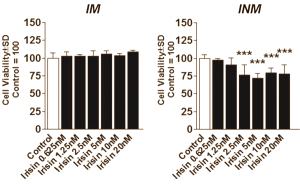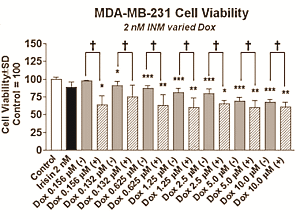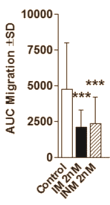|
Irisin is the reason that exercise protects against cancer
The best non-medical cancer therapy is exercise, but we don't know exactly how exercise protects against cancer. Molecular biologists at the University of New Mexico have published in the International Journal of Cancer the results of a fundamental study that should change this situation.
Cancer and exercise
Studies have shown that there are non-medical anti-cancer strategies that work, and the most effective of these is physical exercise. It doesn't matter really what your favourite kind of exercise is as long as you do lots of it and often. The more, the better. For an overview of our posts on the cancer-inhibiting qualities of physical exercise go to the bottom of this page.
Irisin
Exactly how physical exercise messes up cancer cells' lives is not really known, but scientists have put forward a few theories. One of these is that during exertion muscle tissue secretes anti-cancer substances. These are called myokines, and one of the most studied ones of these is irisin [see right]. Irisin is found in the body in several forms: a non-active form that is secreted by the muscles [IM] and an active form that is created from the inactive form [INM].
Vitality
Researchers at the University of New Mexico wondered whether irisin could explain why exercise reduces the chance of developing cancer or the disease returning. To answer this question they exposed aggressive MDA-MB-231 breast cancer cells to active and non-active irisin. And hey presto: active irisin reduced the vitality of the cancer cells. Some of the cells self destructed.

In addition, both forms of irisin reduced the ability of the cancer cells to spread.
In another experiment the researchers exposed the cancer cells to a mix of active irisin and the cancer medicine doxorubicin. Irisin made the cancer cells more vulnerable to the medicine.

Conclusion
"Exercise has been shown to result in reduced cancer risk and improved prognosis of cancer patients", the researchers write. "Our data provides possible insights into potential mechanisms underlying these observations. Moreover, our data supports the hypothesis that irisin may play an important role in future cancer therapeutics, warranting the need for further investigation."
Source:
Int J Cancer. 2015 Feb 15;136(4):E197-202.
More:
Strength training and cardio during chemotherapy 25.11.2012
'Physical activity should be a standard part of cancer care' 22.08.2012
Bootcamp during chemo boosts your chances 19.05.2012
|




